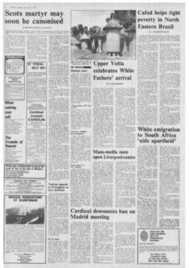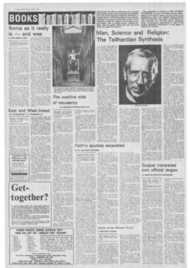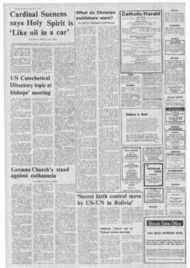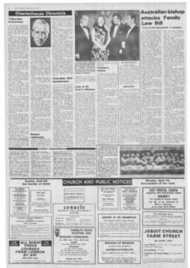Page 8, 4th April 1975
Page 8
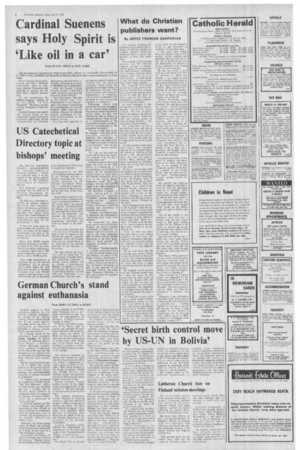
Report an error
Noticed an error on this page?If you've noticed an error in this article please click here to report it.
Tags
Share
Related articles
Defence Of Pius Xli's Attitude To Nazis
Here We Go Again
A Turbulent Decade For The Church
The Hour Of Death Best Left In God's Hands
Everyone Is Manipulated Today, Says Fr Haering
German Church's stand against euthanasia
From JOHN MUTHIG in ROME Despite support of Nazi euthanasia policies by one German Catholic theologian, the attitude of the German Catholic Church during World War II was clearly and indisputably against any form of euthanasia, an American specialist in Vatican wartime history maintained here.
In a 20-page article in the authoritative Jesuit fortnightly Civilta Cattolica, Fr Robert Graham, SJ, admitted that Fr Josef Mayer, a German Catholic theologian, probably wrote a defence of euthanasia for the Nazis. He said that this document, as yet undiscovered, was probably circulated among Nazi officials and hospital staffs.
But the American Jesuit cited a list of public and private protests on the part of Catholic and Lutheran Church leaders showing the uncompromising opposition of German Christians to euthanasia.
Fr Graham also countered the argument of a book entitled "Into That Darkness," written by Gitta Sereny and published last year in London. that Fr Mayer's moral defence of euthanasia might have triggered the issuance of orders by Hitler which led to thousands of "mercy killings."
Fr Graham pointed out that Fr Mayer was probably commissioned by Nazi officials to write a defence of euthanasia, since his unorthodox views on abortion and on sterilisation of the mentally afflicted were widely known.
Moreover, the Jesuit scholar writes, Fr Mayer was probably a Nazi informer and had travelled to Rome at least once on a Nazi intelligence mission.
According to Fr Graham, Fr Mayer was under the control of the Gestapo. "Whether Mayer performed this role of informer
and spy willingly or unwillingly, under blackmail, fear or personal conviction, he was certainly no representative of German Catholic-clerical thought or action."
Fr Mayer had written in support of the State's right to sterilise the mentally ill years before the Nazis rose to power. Also, before the advent of Hitler, he wrote to support the claim that abortion was justified in certain cases. After World War II he retired from the theological academy in Paderborn and died in obscurity early in this decade.
The American specialist on Vatican war documents noted that the Church reacted swiftly and without compromise to orders given by Hitler in October, 1939, which resulted in the deaths of between 80,000 and 100,000 German and Austrian mental incompetents, epileptics, deformed and others judged "unworthy of life."
Several Lutheran Church leaders learned of the highly secret euthanasia policies in the summer of 1940 and appealed to Nazi government ministers to end it.
The Catholic Archbishop Conrad Groeber of Freiburg wrote to a high Nazi official on August 1, 1940, in an attempt to reverse the policy. His letter was followed on August 11 by a letter from Cardinal Adolf Bertram of Breslau (now Wroclaw) on behalf of the entire German hierarchy to the secretary of the German Chancellery.
Cardinal Bertram's letter stressed the impossibility of compromise on the issue and spoke of the "unconditional illicitness of such actions . . . prohibited in a very absolute way " I-17, added: "This is not only the doctrine of faith and morals of the Catholic Church but the conviction of faith and morals of absolutely every Christian."
Fr Graham quoted from similar letters written by German prelates.
He noted that Pope Pius XII "ordered, toward the end of 1940. the Doctrinal Congrega tion to issue a formal and explicit condemnation of the mass homicides which were being carried out in Germany in the name of the purity of the German race."
The Congregation, then called the Holy Office, published that condemnation in traditional question-answerr form in the December 6, 1940, issue of L'Osservatore Romano, the Vatican daily newspaper. The question asked whether it was legal to kill those who, for
physical or mental reasons, were not contributing to the progress of the nation. (Ger many was not mentioned specially.) The Congregation answered succinctly: "In the negative, since that is contrarE, to the natural law and certainly to divine law."
Fr Ciraham also quoted from three famous sermons of Bishop Clemens August von Galen of Munster. Fr Graham said the sermons provoked an inter national furore for their frank opposition to Nazi policies. (Bishop Von Galen was made cardinal after the war.) In his third sermon, Bishop von Galen said: "Once it is ad mitted that some men have the right to kill other 'unproductive' men . . . then by way of principle free rein is given for the killing of all 'unproductive'. men — of the incurably ill, of
disabled war veterans and workers of all of us when we become old and weak and therfore unproductive ... Then not one of us is sure of his life."
blog comments powered by Disqus



